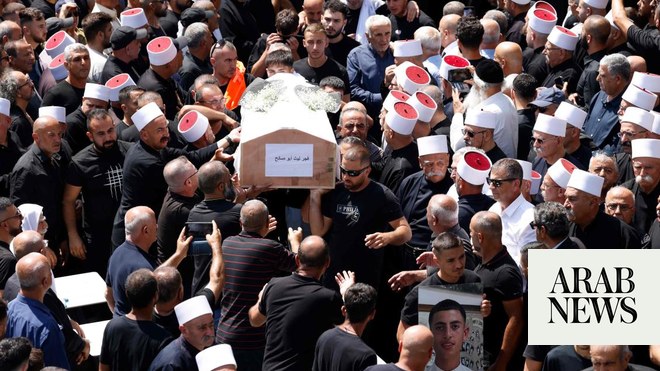Tel Aviv, Israel: At least 11 children and teenagers were killed in a rocket attack on a soccer field on Saturday, the deadliest attack on an Israeli target along the country's northern border since the start of the war between Israel and the Lebanese militant group Hezbollah. . This raised fears of a wider regional war.
Israel blamed Hezbollah for the attack on the Israeli-controlled Golan Heights, but Hezbollah denied any role. Israeli Prime Minister Benjamin Netanyahu warned that Hezbollah “will pay a heavy price for this attack, a price it has not paid so far.”
Israel's top military spokesman, Daniel Hagari, called the attack the deadliest attack on Israeli civilians since the October 7 attack by Hamas that sparked the Gaza war. He said that 20 others were injured.
Israel's Foreign Minister Israel Katz told Israel's Channel 12: “There is no doubt that Hezbollah has crossed all the red lines here, and the response will reflect that.”
Hezbollah's chief spokesman, Mohammad Afif, told The Associated Press that the group “categorically denies carrying out the attack on Majdal Shams.” It is unusual for Hezbollah to deny the attack.
The attack on the soccer field, just before sunset, followed earlier border violence on Saturday, when Hezbollah said three of its fighters had been killed, without specifying where. The Israeli military announced that the regime's air force targeted a Hezbollah weapons depot in the border village of Kfar Kila, adding that the militants were inside at the time.
Hezbollah announced that its fighters carried out 10 different attacks using rockets and explosive drones against Israeli military positions, the latest of which was targeting the Haramon Brigade army command in Ma'ala Jolani with Katyusha missiles. Hezbollah announced in a separate statement that it targeted the same army post with a short-range Falaq rocket. The organization announced that these attacks were in response to Israeli airstrikes on villages in southern Lebanon.
Netanyahu's office, who is on a trip to the United States, said he would cut his trip short by a few hours, without specifying when he would return. It is said that he will form the security cabinet after his arrival.
The extreme right members of Netanyahu's government called for a strong reaction against Hezbollah. But an all-out war with a militia group with far superior firepower to Hamas will prove difficult for the IDF after nearly 10 months of fighting in Gaza.
The footage broadcast by Israel's Channel 12 shows a large explosion in one of the valleys of the Druze city of Majdal Shams in the Golan Heights, which Israel captured from Syria in the 1967 Middle East war and annexed in 1981. Some Druze have Israeli citizenship. Many still sympathize with Syria and reject Israeli annexation, but their ties to Israeli society have grown over the years.
Video shows paramedics carrying stretchers from the soccer field to waiting ambulances.
Hael Mahmoud, a resident, told Channel 12 that the children were playing soccer when the rocket hit the ground. He said a siren sounded seconds before the missile hit, but there was no time to take cover.
Jehan Safadi, the principal of an elementary school, told Channel 12: “The situation here is very difficult. There are five students among the dead.” Parents are crying, people are shouting outside. “No one can digest what happened.”
The Israeli military said its analysis showed the missile was fired from an area north of the village of Chebaa in southern Lebanon.
The United States will continue to support efforts to end these horrific attacks along the Blue Line, which must be a priority, the White House National Security Council said in a statement. Our support for Israel's security against all Iranian-backed terrorist groups, including Lebanon's Hezbollah, is ironclad and unwavering.
In a statement that did not name Majdal Sham, the Lebanese government called for an “immediate cessation of hostilities on all fronts” and condemned all attacks against civilians.
Israel and Hezbollah have been exchanging fire since October 8, a day after Hamas militants attacked southern Israel. In recent weeks, the exchange of fire along the Lebanese-Israeli border has intensified, with Israeli airstrikes and Hezbollah missile and drone strikes striking deeper and farther from the borders.
The Israeli army said, without giving reasons, that Majdal Shams was not among the border communities that were ordered to evacuate due to tensions. This city is not directly on the border with Lebanon.
Officials from countries including the United States and France have visited Lebanon to ease tensions, but have been unable to make progress. As long as Israel's attack on Gaza continues, Hezbollah has refused to cease fire. Israel and Hezbollah had an inconclusive war in 2006.
Saturday's violence comes as Israel and Hamas discuss a cease-fire proposal that would end the nearly 10-month war in Gaza and free the roughly 110 hostages held there. The attack by Hamas on October 7 killed around 1,200 people and took 250 hostages. According to local health officials, the Israeli attack has killed more than 39,000 people.
Since early October, Israeli airstrikes in Lebanon have killed more than 450 people, mostly members of Hezbollah, as well as about 90 civilians and civilians. On the Israeli side, 44 people have been killed, of which at least 21 were soldiers.
